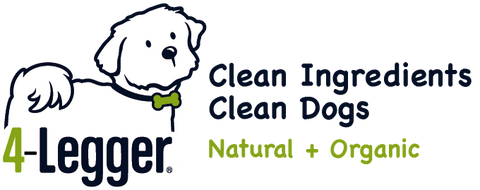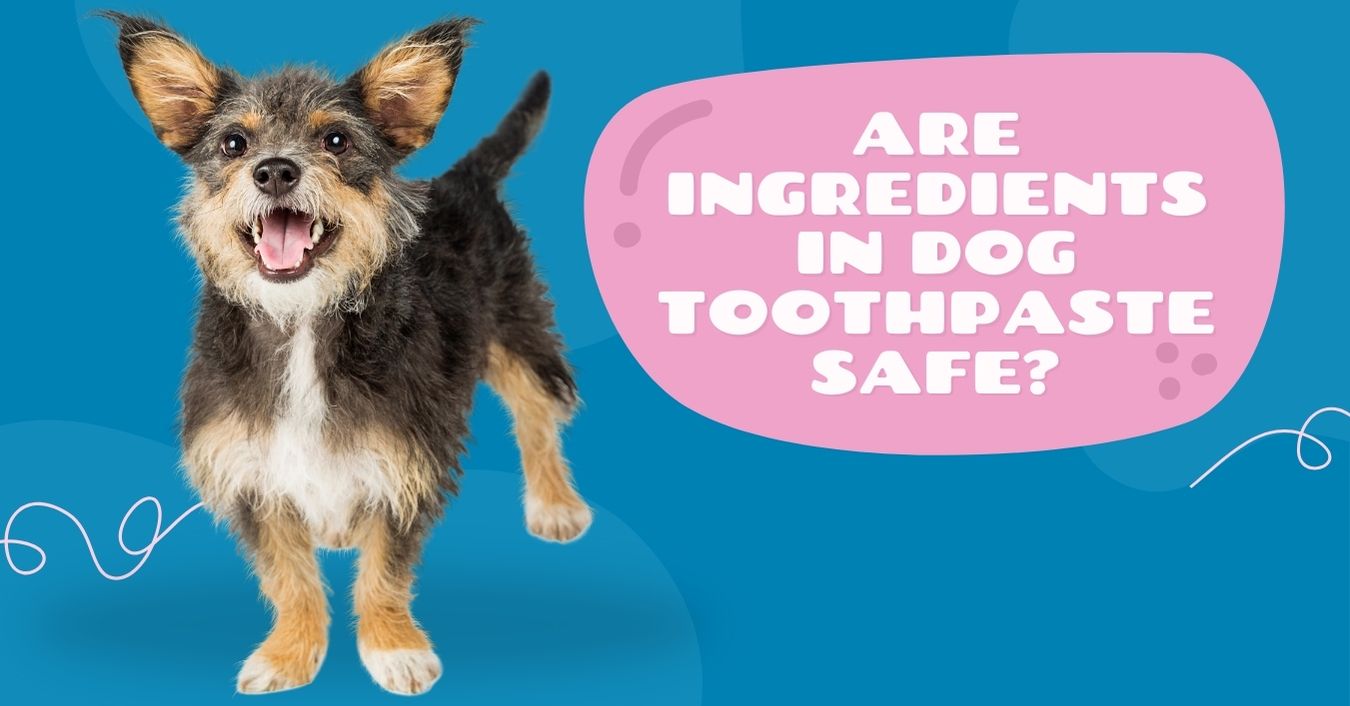Are Ingredients in Dog Toothpaste Safe?
As a pet parent devoted to natural ingredients, you're always looking for the best ways to care for your furry family, including their oral and dental health.
Brushing your dog's teeth is often considered the gold standard for maintaining oral hygiene. View our step-by-step guide for how to establish a healthy dental hygiene routine with your dog.
We all know to avoid using human toothpaste which often has xylitol (also called birch sugar) in it - a sugar substitute that is extremely toxic to dogs. Even small amounts can cause hypoglycemia (low blood sugar), seizures, liver failure, or even death in dogs.
But have you ever stopped to consider the safety of the ingredients in your dog's toothpaste or dental product?
Ingredients in Dog Toothpaste
Here are some common ingredients typically found in dog toothpastes and their potential harmful effects or why you may want to avoid these ingredients:
-
Fluoride: Fluoride is a common element in nature, found in air and in naturally occurring water sources. In the mid 1940s the United States started adding fluoride to tap water to help support tooth enamel. In recent years, there has been a movement to reduce or remove fluoride from drinking water as research has found it is better to deliver fluoride topically rather than systemically. This has created a new issue - fluoride toxicity in children before the age of 6 years old. More than 80% of fluoride toxicity is seen in children before the age of 6 years, due to ingestion of fluoride-containing toothpaste or mouthwash. The Merck Veterinary Manual warns that mouth or teeth-cleaning products with fluoride present a danger to pets, especially dogs for the same reason it is toxic to children - ingestion resulting in gastrointestinal upset (nausea, vomiting, abdominal pain, diarrhea), and a reduction in the amount of calcium in bones causing bone weakness.
-
Alcohol: Some dental products for dogs may contain alcohol, which does kill bacteria in the mouth, but it also kills the good bacteria used during digestion. Long term use of alcohol can cause dryness in the mouth resulting in irritation of the gums which can be painful for your dog.
-
Sodium Lauryl Sulfate (SLS): The most commonly used foaming agent in human toothpaste, it helps to bind with impurities and has some mild antibacterial properties. Unfortunately, SLS is linked with gastric upset in dogs.
-
Artificial Sweeteners and Flavors: Artificial sweeteners like dextrose and flavors may cause gastrointestinal upset in dogs. As mentioned previously, xylitol is extremely toxic to dogs.
Notably, the best reason to avoid giving it to your dog is that sugar and sugar substitutes are unnecessary in pet products. Dogs don't naturally crave sugar, but they can become addicted to it just like we can.
-
Sodium Hexametaphosphate (SHMP): Used in some dental chews, toothpastes, and as a water additive, SHMP may be contaminated with heavy metals which may cause long term kidney, liver, and thyroid issues. The risk goes down if using high quality purified food grade SHMP tested for heavy metals. Short term exposure may be acceptable to reduce tartar and gum disease but long-term use is questionable based upon exposure to heavy metal contamination.
-
Sorbitol: While generally considered to be safe for dogs, sorbitol is a laxative which can cause diarrhea in dogs if enough if ingested.
-
Propylene Glycol: Used to help retain moisture, propylene glycol is generally considered safe in small amounts, but in larger doses, it can be toxic to dogs.
-
Artificial Colors: Artificial colors are typically derived from petroleum or coal tar. They have links to hypersensitivity reactions and cancer. Check the ingredient list for these common names: FD&C or D&C followed by a color and number (e.g., FD&C Red No. 40), Blue 1 and 2, Green 3, etc.).
-
So Called Natural Flavors: When you see "natural flavors" on the ingredient list, it is best to avoid the product as you have no idea what it really is you are putting into your dog's mouth.
- Diethanolamine (DEA): A petrochemical derivative used to help prevent tartar buildup and reduce plaque. The American Dental Association (ADA) also suggests avoiding toothpaste containing DEA, because it can react with other ingredients to form nitrosamines, which are toxic to humans and a known carcinogen. It’s possible that diethanolamine (DEA) may have carcinogenic effects and cause allergic reactions. Plus, there are concerns that it’s a hormone disruptor.
Selecting A Safe and Non-Toxic Dog Toothpaste
In 2016, 4-Legger set out to develop a safe oral care and dental hygiene solution free from artificial sweeteners, fluoride, alcohol, artificial flavors, and colors.
We looked at a lot of dog toothpaste products including other options such as water additives and gels, developing a list of ingredients that we didn't want in our dog's mouths.
We then went back to the basics using the principles of canine anatomy and physiology to create a product that would stimulate a dog’s natural ability to release enzymes found in their saliva to combat germs and bacteria in their mouth. Using time-tested all-natural ingredients to effectively and safely enhance your dog's oral hygiene include: Baking soda, salt, and high quality peppermint essential oil.
- Baking Soda is highly alkaline, and because of this it creates an environment that is not favorable to bacteria while also neutralizing acids in the mouth which cause tooth decay and dental cavities. For centuries baking soda has worked to naturally whiten teeth and freshen breath. It's just abrasive enough to clean your dog's teeth of oral plaque without deteriorating their tooth enamel.
- Sea Salt is packed with minerals (calcium, magnesium, silicon, phosphorus, sodium, nickel, iodine & iron) that reduce inflammation, strengthen gums, and neutralize acids while being abrasive enough to clean but not damage the tooth enamel. Sea salt also increases the production of saliva allowing your dog's natural enzymes and antibacterials to safeguard their enamel while fighting germs and bacteria. Our sea salt is ground into a very fine powder to prevent it from irritating the gums and being overly abrasive on the teeth.
- High Quality Peppermint Essential Oil makes your dog's breath minty fresh and is extremely effective at killing anaerobic bacteria, the type of bacteria that thrives in a low oxygen environment such as the mouth - protecting your dog's mouth from gum disease. Peppermint is also very cooling and will help soothe red and irritated gums.
When we showcased our Dental Powder at the American Holistic Veterinary Medical Association Conference, the veterinarians attending fell in love with it! We had many coming over to talk to us and loved the simple principle of the product based on canine physiology. Subsequently, many veterinarians now recommend and stock it in their own veterinary practices.
With many products on the market disrupting the balance of beneficial bacteria in the mouth, our product works to stimulate your dog's own natural ability to release enzymes through salivation to fight germs and bacteria and help stave off plaque and gum disease.
Give your dog a healthy smile with 4-Legger's all natural alternative to dog toothpaste!





